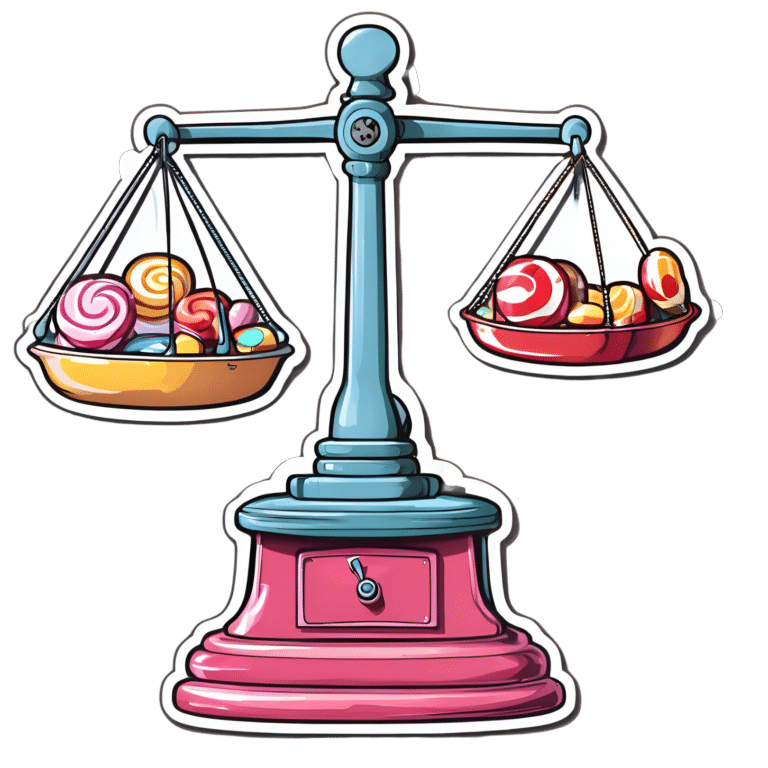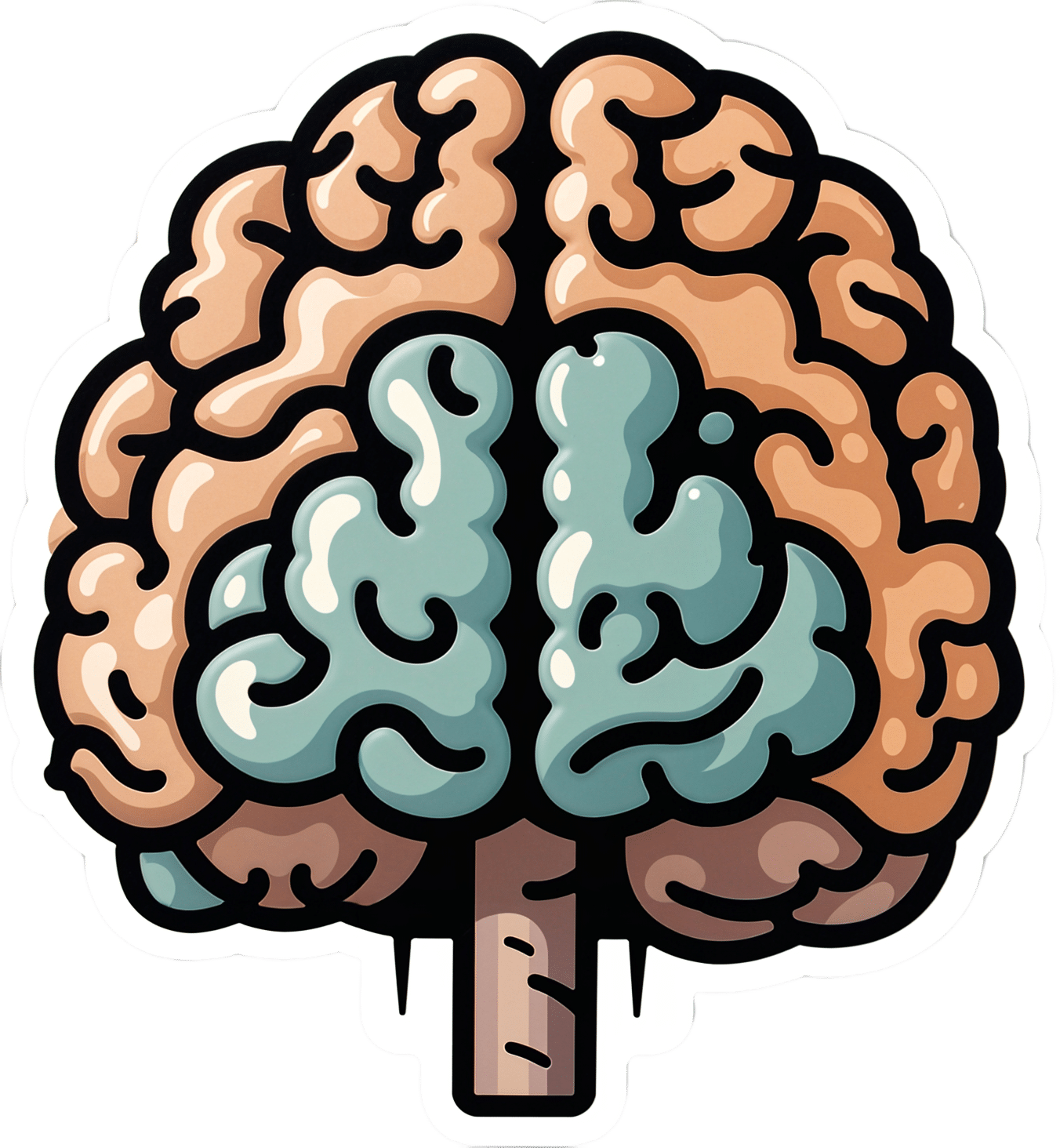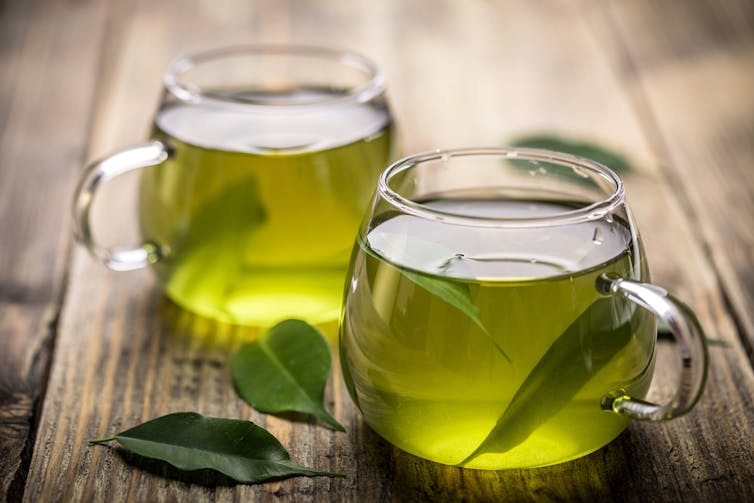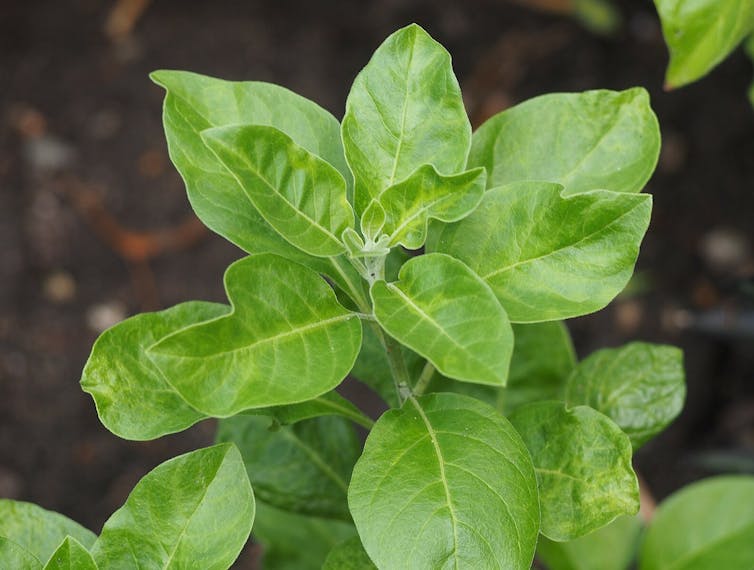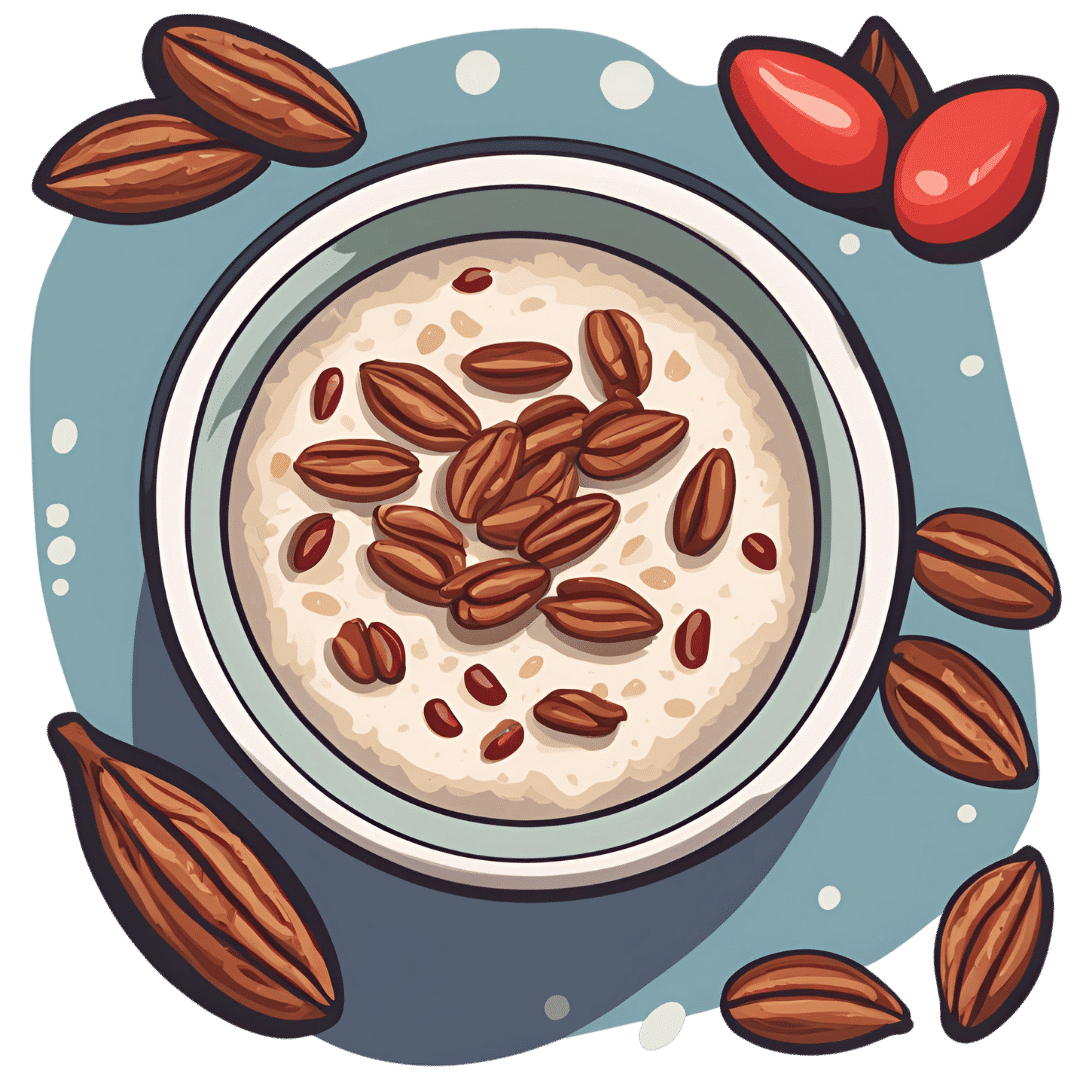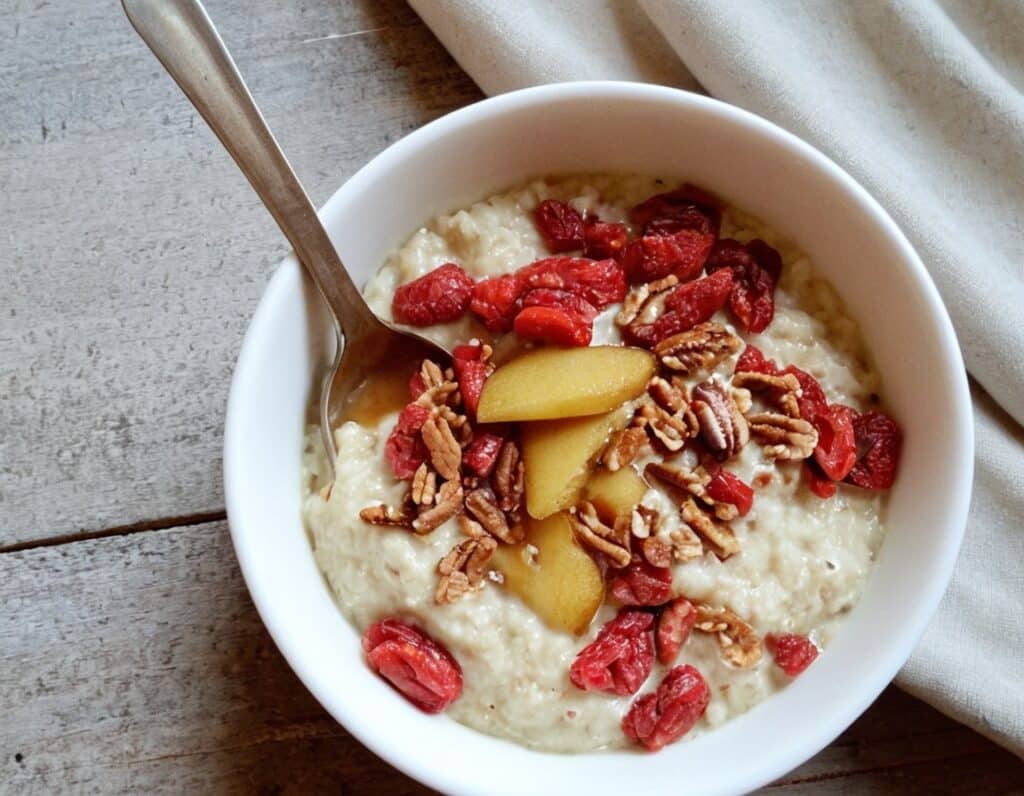
The Stress Prescription (Against Aging!)
10almonds is reader-supported. We may, at no cost to you, receive a portion of sales if you purchase a product through a link in this article.
The Stress Prescription (Against Aging!)
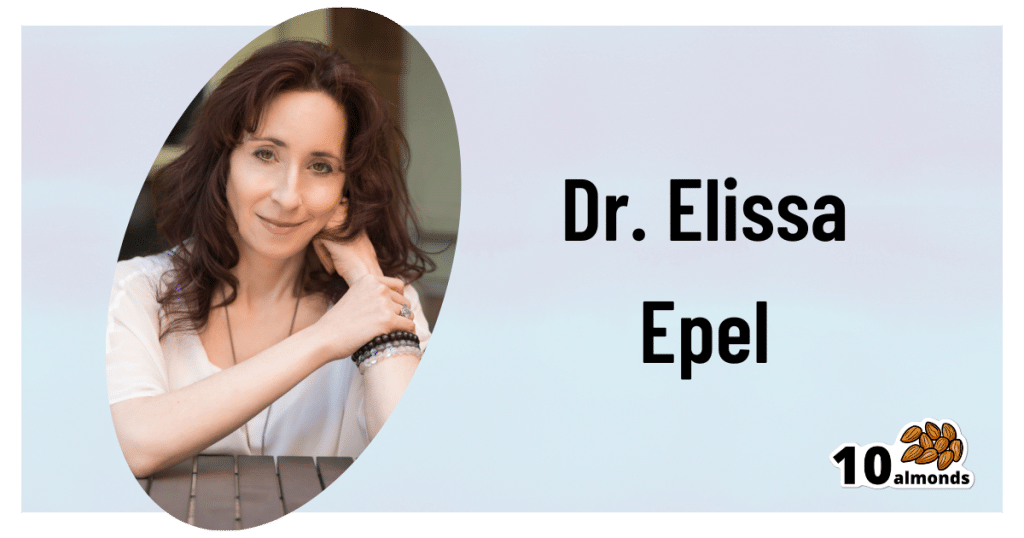
This is Dr. Elissa Epel, whose work has for the past 20 years specialized in the effect of stress on aging. She’s led groundbreaking research on cortisol, telomeres, and telomerase, all in the context of aging, especially in women, as well as the relationship between stress and weight gain. She was elected member of the National Academy of Medicine for her work on stress pathways, and has been recognized as a key “Influencer in Aging” by the Alliance for Aging Research.
Indeed, she’s also been named in the top 0.1% of researchers globally, in terms of publication impact.
What’s that about stress and aging?
In her words,
❝Women with the highest levels of perceived stress have telomeres shorter on average by the equivalent of at least one decade of additional aging compared to low stress women❞
Source: Accelerated telomere shortening in response to life stress
We say “in her words”, as she is the top-listed author on this paper—an honour reserved for the lead researcher of any given study/paper.
However, we’d be remiss not to note that the second-listed author is Nobel Prize Laureate Dr. Elizabeth Blackburn. What a team! Maybe we’ll do a spotlight feature on Dr. Blackburn’s work one of these days, but for now, back to Dr. Epel…
What does she want us to do about it?
She has the following advice for us:
Let go of what we can’t control
This one is simple enough, and can be as simple as learning how to set anxiety aside, and taking up the practice of radical acceptance of what we cannot control.
Be challenged, not afraid
This is about eustress, and being the lion, not the gazelle. Dr. Epel uses the example of how when lions are hunting gazelles, both are stressed, but both are feeling the physiological effects of that stress in terms of the augmentation to their immediate abilities, but only one of them is suffering by it.
We’ll let her explain how to leverage this:
TED ideas | Here’s how you can handle stress like a lion, not a gazelle | Dr. Elissa Epel
Build resilience through controlled discomfort
Don’t worry, you don’t have to get chased by lions. A cold shower will do it! This is about making use of hormesis, the body’s ability to build resilience to stressors by small doses of controlled cortisol release—as for example when one undergoes thermal shock, which sounds drastic, but for most people, a cold shower (or even an ice bath) is safe enough.
You can read more about this here:
A Cold Shower A Day Keeps The Doctor Away
Connect with nature
You don’t have to hug a tree, but you do have get to a natural (or at least, natural-seeming) environment once in a while. Simply put, we did not evolve to be in the urban or even suburban settings where most of us spend most of our time. Getting to be around greenery with at least some kind of regularity is hugely beneficial. It doesn’t have to be a national park; a nice garden or local park can suffice, and potted plants at home are better than nothing. Even spending time in virtual reality “nature” is an option:
(you can see an example there, of the kind of scenery this study used)
Breathe deeply, and rest deeply
Mindful breathing, and good quality sleep, are very strongly evidence-based approaches to reduce stress, for example:
Practice gratitude to build optimism
Optimism has a huge positive impact on health outcomes, even when other factors (including socioeconomic factors, pre-existing conditions, and general reasons for one person to be more optimistic than another) are controlled for.
Read: Optimism and Cause-Specific Mortality: A Prospective Cohort Study
There are various ways to increase optimism, and practising gratitude is one of them—but that doesn’t necessarily mean abandoning realism, either:
How To Practise (Non-Toxic) Positivity
There are other ways too, though, and Dr. Epel discusses some with her friend and colleague, Dr. Elizabeth Blackburn, here:
Want to learn more from Dr. Epel?
We reviewed one of her books, The Telomere Effect, previously. It’s about what we can do to lengthen our telomeres (a key factor in health aging; effectively, being biologically younger). You also might enjoy her newer book, The Stress Prescription, as well as her blog.
Enjoy!
Don’t Forget…
Did you arrive here from our newsletter? Don’t forget to return to the email to continue learning!
Recommended
Learn to Age Gracefully
Join the 98k+ American women taking control of their health & aging with our 100% free (and fun!) daily emails:
-
Nicotine Benefits (That We Don’t Recommend)!
10almonds is reader-supported. We may, at no cost to you, receive a portion of sales if you purchase a product through a link in this article.
It’s Q&A Day at 10almonds!
Have a question or a request? We love to hear from you!
In cases where we’ve already covered something, we might link to what we wrote before, but will always be happy to revisit any of our topics again in the future too—there’s always more to say!
As ever: if the question/request can be answered briefly, we’ll do it here in our Q&A Thursday edition. If not, we’ll make a main feature of it shortly afterwards!
So, no question/request too big or small
❝Does nicotine have any benefits at all? I know it’s incredibly addictive but if you exclude the addiction, does it do anything?❞
Good news: yes, nicotine is a stimulant and can be considered a performance enhancer, for example:
❝Compared with the placebo group, the nicotine group exhibited enhanced motor reaction times, grooved pegboard test (GPT) results on cognitive function, and baseball-hitting performance, and small effect sizes were noted (d = 0.47, 0.46 and 0.41, respectively).❞
Read in full: Acute Effects of Nicotine on Physiological Responses and Sport Performance in Healthy Baseball Players
However, another study found that its use as a cognitive enhancer was only of benefit when there was already a cognitive impairment:
❝Studies of the effects of nicotinic systems and/or nicotinic receptor stimulation in pathological disease states such as Alzheimer’s disease, Parkinson’s disease, attention deficit/hyperactivity disorder and schizophrenia show the potential for therapeutic utility of nicotinic drugs.
In contrast to studies in pathological states, studies of nicotine in normal-non-smokers tend to show deleterious effects.
This contradiction can be resolved by consideration of cognitive and biological baseline dependency differences between study populations in terms of the relationship of optimal cognitive performance to nicotinic receptor activity.
Although normal individuals are unlikely to show cognitive benefits after nicotinic stimulation except under extreme task conditions, individuals with a variety of disease states can benefit from nicotinic drugs❞
Read in full: Effects of nicotinic stimulation on cognitive performance
Bad news: its addictive qualities wipe out those benefits due to tolerance and thus normalization in short order. So you may get those benefits briefly, but then you’re addicted and also lose the benefits, as well as also ruining your health—making it a lose/lose/lose situation quite quickly.
As an aside, while nicotine is poisonous per se, in the quantities taken by most users, the nicotine itself is not usually what kills. It’s mostly the other stuff that comes with it (smoking is by far and away the worst of all; vaping is relatively less bad, but that’s not a strong statement in this case) that causes problems.
See also: Vaping: A Lot Of Hot Air?
However, this is still not an argument for, say, getting nicotine gum and thinking “no harmful effects” because then you’ll be get a brief performance boost yes before it runs out and being addicted to it and now being in a position whereby if you stop, your performance will be lower than before you started (since you now got used to it, and it became your new normal), before eventually recovering:
In summary
We recommend against using nicotine in the first place, and for those who are addicted, we recommend quitting immediately if not contraindicated (check with your doctor if unsure; there are some situations where it is inadvisable to take away something your body is dependent on, until you correct some other thing first).
For more on quitting in general, see:
Addiction Myths That Are Hard To Quit
Take care!
Share This Post
-
What are nootropics and do they really boost your brain?
10almonds is reader-supported. We may, at no cost to you, receive a portion of sales if you purchase a product through a link in this article.
Humans have long been searching for a “magic elixir” to make us smarter, and improve our focus and memory. This includes traditional Chinese medicine used thousands of years ago to improve cognitive function.
Now we have nootropics, also known as smart drugs, brain boosters or cognitive enhancers.
You can buy these gummies, chewing gums, pills and skin patches online, or from supermarkets, pharmacies or petrol stations. You don’t need a prescription or to consult a health professional.
But do nootropics actually boost your brain? Here’s what the science says.
LuckyStep/Shutterstock What are nootropics and how do they work?
Romanian psychologist and chemist Cornelius E. Giurgea coined the term nootropics in the early 1970s to describe compounds that may boost memory and learning. The term comes from the Greek words nӧos (thinking) and tropein (guide).
Nootropics may work in the brain by improving transmission of signals between nerve cells, maintaining the health of nerve cells, and helping in energy production. Some nootropics have antioxidant properties and may reduce damage to nerve cells in the brain caused by the accumulation of free radicals.
But how safe and effective are they? Let’s look at four of the most widely used nootropics.
1. Caffeine
You might be surprised to know caffeine is a nootropic. No wonder so many of us start our day with a coffee. It stimulates our nervous system.
Caffeine is rapidly absorbed into the blood and distributed in nearly all human tissues. This includes the brain where it increases our alertness, reaction time and mood, and we feel as if we have more energy.
For caffeine to have these effects, you need to consume 32-300 milligrams in a single dose. That’s equivalent to around two espressos (for the 300mg dose). So, why the wide range? Genetic variations in a particular gene (the CYP1A2 gene) can affect how fast you metabolise caffeine. So this can explain why some people need more caffeine than others to recognise any neurostimulant effect.
Unfortunately too much caffeine can lead to anxiety-like symptoms and panic attacks, sleep disturbances, hallucinations, gut disturbances and heart problems.
So it’s recommended adults drink no more than 400mg caffeine a day, the equivalent of up to three espressos.
Caffeine can make you feel alert and can boost your mood. That makes it a nootropic. LHshooter/Shutterstock 2. L-theanine
L-theanine comes as a supplement, chewing gum or in a beverage. It’s also the most common amino acid in green tea.
Consuming L-theanine as a supplement may increase production of alpha waves in the brain. These are associated with increased alertness and perception of calmness.
However, it’s effect on cognitive functioning is still unclear. Various studies including those comparing a single dose with a daily dose for several weeks, and in different populations, show different outcomes.
But taking L-theanine with caffeine as a supplement improved cognitive performance and alertness in one study. Young adults who consumed L-theanine (97mg) plus caffeine (40mg) could more accurately switch between tasks after a single dose, and said they were more alert.
Another study of people who took L-theanine with caffeine at similar doses to the study above found improvements in several cognitive outcomes, including being less susceptible to distraction.
Although pure L-theanine is well tolerated, there are still relatively few human trials to show it works or is safe over a prolonged period of time. Larger and longer studies examining the optimal dose are also needed.
The amino acid L-theanine is also in green tea. grafvision/Shutterstock 3. Ashwaghanda
Ashwaghanda is a plant extract commonly used in Indian Ayurvedic medicine for improving memory and cognitive function.
In one study, 225-400mg daily for 30 days improved cognitive performance in healthy males. There were significant improvements in cognitive flexibility (the ability to switch tasks), visual memory (recalling an image), reaction time (response to a stimulus) and executive functioning (recognising rules and categories, and managing rapid decision making).
There are similar effects in older adults with mild cognitive impairment.
But we should be cautious about results from studies using Ashwaghanda supplements; the studies are relatively small and only treated participants for a short time.
Ashwaghanda is a plant extract commonly used in Ayurvedic medicine. Agnieszka Kwiecień, Nova/Wikimedia, CC BY-SA 4. Creatine
Creatine is an organic compound involved in how the body generates energy and is used as a sports supplement. But it also has cognitive effects.
In a review of available evidence, healthy adults aged 66-76 who took creatine supplements had improved short-term memory.
Long-term supplementation may also have benefits. In another study, people with fatigue after COVID took 4g a day of creatine for six months and reported they were better able to concentrate, and were less fatigued. Creatine may reduce brain inflammation and oxidative stress, to improve cognitive performance and reduce fatigue.
Side effects of creatine supplements in studies are rarely reported. But they include weight gain, gastrointestinal upset and changes in the liver and kidneys.
Where to now?
There is good evidence for brain boosting effects of caffeine and creatine. But the jury is still out on the efficacy, optimal dose and safety of most other nootropics.
So until we have more evidence, consult your health professional before taking a nootropic.
But drinking your daily coffee isn’t likely to do much harm. Thank goodness, because for some of us, it is a magic elixir.
Nenad Naumovski, Professor in Food Science and Human Nutrition, University of Canberra; Amanda Bulman, PhD candidate studying the effects of nutrients on sleep, University of Canberra, and Andrew McKune, Professor, Exercise Science, University of Canberra
This article is republished from The Conversation under a Creative Commons license. Read the original article.
Share This Post
-
7 Invisible Eating Disorders
10almonds is reader-supported. We may, at no cost to you, receive a portion of sales if you purchase a product through a link in this article.
It’s easy to assume that anyone with an eating disorder can be easily recognized by the resultantly atypical body composition, but it’s often not so.
Beyond the obvious
We’ll not keep them a mystery; the 7 invisible eating disorders discussed by therapist Kati Morton in this video are:
- OSFED (Other Specified Feeding or Eating Disorder): a catch-all diagnosis for those who don’t meet the criteria for more specific eating disorders but still have significant eating disorder behaviors.
- Atypical Anorexia: characterized by all the symptoms of anorexia nervosa (especially: intense fear of gaining weight, and body image distortion) except that the individual’s weight remains in a normal range.
- Atypical Bulimia: similar to bulimia nervosa, but the frequency or duration of binge-purge behaviors does not meet the usual diagnostic criteria and thus can fly under the radar.
- Atypical Binge-Eating Disorder: has episodes of consuming large amounts of food without compensatory behaviors (e.g. purging), but the episodes are less frequent and/or intense than typical binge-eating disorder.
- Purging Disorder: purging behaviors such as self-induced vomiting or laxative abuse without having binge-eating episodes (thus, this not being binging, and nothing obvious is happening outside of the bathroom).
- Night Eating Syndrome: consuming excessive amounts of food during the night while being fully aware of the nature of the eating episodes, which disrupts sleep and leads to guilt.
- Rumination Disorder: repeatedly regurgitating food, which may be rechewed, reswallowed, or spat out, without nausea or involuntary retching, often as a self-soothing mechanism.
For more on each of these, along with a case study-style example of each, enjoy:
Click Here If The Embedded Video Doesn’t Load Automatically!
Want to learn more?
You might also like to read:
Eating Disorders: More Varied (And Prevalent) Than People Think
Take care!
Share This Post
Related Posts
-
Can I take antihistamines everyday? More than the recommended dose? What if I’m pregnant? Here’s what the research says
10almonds is reader-supported. We may, at no cost to you, receive a portion of sales if you purchase a product through a link in this article.
Allergies happen when your immune system overreacts to a normally harmless substance like dust or pollen. Hay fever, hives and anaphylaxis are all types of allergic reactions.
Many of those affected reach quickly for antihistamines to treat mild to moderate allergies (though adrenaline, not antihistamines, should always be used to treat anaphylaxis).
If you’re using oral antihistamines very often, you might have wondered if it’s OK to keep relying on antihistamines to control symptoms of allergies. The good news is there’s no research evidence to suggest regular, long-term use of modern antihistamines is a problem.
But while they’re good at targeting the early symptoms of a mild to moderate allergic reaction (sneezing, for example), oral antihistamines aren’t as effective as steroid nose sprays for managing hay fever. This is because nasal steroid sprays target the underlying inflammation of hay fever, not just the symptoms.
Here are the top six antihistamines myths – busted.
Andrea Piacquadio/Pexels Myth 1. Oral antihistamines are the best way to control hay fever symptoms
Wrong. In fact, the recommended first line medical treatment for most patients with moderate to severe hay fever is intranasal steroids. This might include steroid nose sprays (ask your doctor or pharmacist if you’d like to know more).
Studies have shown intranasal steroids relieve hay fever symptoms better than antihistamine tablets or syrups.
To be effective, nasal steroids need to be used regularly, and importantly, with the correct technique.
In Australia, you can buy intranasal steroids without a doctor’s script at your pharmacy. They work well to relieve a blocked nose and itchy, watery eyes, as well as improve chronic nasal blockage (however, antihistamine tablets or syrups do not improve chronic nasal blockage).
Some newer nose sprays contain both steroids and antihistamines. These can provide more rapid and comprehensive relief from hay fever symptoms than just oral antihistamines or intranasal steroids alone. But patients need to keep using them regularly for between two and four weeks to yield the maximum effect.
For people with seasonal allergic rhinitis (hayfever), it may be best to start using intranasal steroids a few weeks before the pollen season in your regions hits. Taking an antihistamine tablet as well can help.
Antihistamine eye drops work better than oral antihistamines to relieve acutely itchy eyes (allergic conjunctivitis).
Myth 2. My body will ‘get used to’ antihistamines
Some believe this myth so strongly they may switch antihistamines. But there’s no scientific reason to swap antihistamines if the one you’re using is working for you. Studies show antihistamines continue to work even after six months of sustained use.
Myth 3. Long-term antihistamine use is dangerous
There are two main types of antihistamines – first-generation and second-generation.
First-generation antihistamines, such as chlorphenamine or promethazine, are short-acting. Side effects include drowsiness, dry mouth and blurred vision. You shouldn’t drive or operate machinery if you are taking them, or mix them with alcohol or other medications.
Most doctors no longer recommend first-generation antihistamines. The risks outweigh the benefits.
The newer second-generation antihistamines, such as cetirizine, fexofenadine, or loratadine, have been extensively studied in clinical trials. They are generally non-sedating and have very few side effects. Interactions with other medications appear to be uncommon and they don’t interact badly with alcohol. They are longer acting, so can be taken once a day.
Although rare, some side effects (such as photosensitivity or stomach upset) can happen. At higher doses, cetirizine can make some people feel drowsy. However, research conducted over a period of six months showed taking second-generation antihistamines is safe and effective. Talk to your doctor or pharmacist if you’re concerned.
Allergies can make it hard to focus. Pexels/Edward Jenner Myth 4. Antihistamines aren’t safe for children or pregnant people
As long as it’s the second-generation antihistamine, it’s fine. You can buy child versions of second-generation antihistamines as syrups for kids under 12.
Though still used, some studies have shown certain first-generation antihistamines can impair childrens’ ability to learn and retain information.
Studies on second-generation antihistamines for children have found them to be safer and better than the first-generation drugs. They may even improve academic performance (perhaps by allowing kids who would otherwise be distracted by their allergy symptoms to focus). There’s no good evidence they stop working in children, even after long-term use.
For all these reasons, doctors say it’s better for children to use second-generation than first-generation antihistimines.
What about using antihistimines while you’re pregnant? One meta analysis of combined study data including over 200,000 women found no increase in fetal abnormalities.
Many doctors recommend the second-generation antihistamines loratadine or cetirizine for pregnant people. They have not been associated with any adverse pregnancy outcomes. Both can be used during breastfeeding, too.
Myth 5. It is unsafe to use higher than the recommended dose of antihistamines
Higher than standard doses of antihistamines can be safely used over extended periods of time for adults, if required.
But speak to your doctor first. These higher doses are generally recommended for a skin condition called chronic urticaria (a kind of chronic hives).
Myth 6. You can use antihistamines instead of adrenaline for anaphylaxis
No. Adrenaline (delivered via an epipen, for example) is always the first choice. Antihistamines don’t work fast enough, nor address all the problems caused by anaphylaxis.
Antihistamines may be used later on to calm any hives and itching, once the very serious and acute phase of anaphylaxis has been resolved.
In general, oral antihistamines are not the best treatment to control hay fever – you’re better off with steroid nose sprays. That said, second-generation oral antihistamines can be used to treat mild to moderate allergy symptoms safely on a regular basis over the long term.
Janet Davies, Respiratory Allergy Stream Co-chair, National Allergy Centre of Excellence; Professor and Head, Allergy Research Group, Queensland University of Technology; Connie Katelaris, Professor of Immunology and Allergy, Western Sydney University, and Joy Lee, Respiratory Allergy Stream member, National Allergy Centre of Excellence; Associate Professor, School of Public Health and Preventive Medicine, Monash University
This article is republished from The Conversation under a Creative Commons license. Read the original article.
Don’t Forget…
Did you arrive here from our newsletter? Don’t forget to return to the email to continue learning!
Learn to Age Gracefully
Join the 98k+ American women taking control of their health & aging with our 100% free (and fun!) daily emails:
-
Spiced Pear & Pecan Polyphenol Porridge
10almonds is reader-supported. We may, at no cost to you, receive a portion of sales if you purchase a product through a link in this article.
Porridge doesn’t have to be boring; in fact, it can be a real treat. And while oats are healthy by default, this version has extra layers of benefits:
You will need
Per person:
- 1 cup milk (your choice what kind; we recommend almond for this)
- ½ cup oats
- 1 pear, peeled, cored, and sliced
- ¼ cup toasted pecans, chopped
- 2 tbsp goji berries
- 1 tsp sweet cinnamon
Method
(we suggest you read everything at least once before doing anything)
1) Soak the goji berries in a small amount of hot water. If you have an espresso cup or something of a similar size, that’s a great “bowl” for this task. A ramekin will suffice, otherwise, but use only as much water as is absolutely necessary to cover the goji berries (excess water will just leech polyphenols from the berries, reducing their nutritional value).
2) Combine the pear and cinnamon in a saucepan with a couple of tablespoons of water, and simmer for 5 minutes.
3) Combine the oats and milk in a separate saucepan (we imagine you know how to make porridge, but we’d be remiss to not include the step), and simmer for 5 minutes, stirring as necessary.
4) Drain the goji berries and the pear, if there is water remaining outside of the fruits.
5) Assemble: we recommend the order: goji berries, porridge, pear, pecans.
Alternative method: simply layer everything in a slow cooker, in the following order: goji berries (no need to pre-soak), oats, milk (stir it a little to ensure oats are all wet), pear-dusted-with-cinnamon (no need to pre-cook), pecans. Put it on the lowest heat with the lid on, and leave for a couple of hours.
Alternative alternative method: layer everything as we just said, but this time in portions of 1 jar per person, and leave it overnight, per overnight oats. Then, in the morning, gently warm it (if you like) by putting it in the microwave (lid removed!) for 2 minutes on medium power.
These latter methods are increasingly better nutritionally, as they won’t wash away some of the polyphenols from the goji berries and the lower temperatures keep the glycemic index of the oats lower, but we appreciate you won’t always have the time to do it this way.
Enjoy!
Want to learn more?
For those interested in some of the science of what we have going on today:
- The Best Kind Of Fiber For Overall Health? ← it’s β-glucan, as found in oats!
- Why You Should Diversify Your Nuts!
- Goji Berries: Which Benefits Do They Really Have?
- Sweet Cinnamon vs Regular Cinnamon – Which is Healthier? ← this is a very important distinction
- Make Overnight Oats Shorter Or Longer For Different Benefits!
Take care!
Don’t Forget…
Did you arrive here from our newsletter? Don’t forget to return to the email to continue learning!
Learn to Age Gracefully
Join the 98k+ American women taking control of their health & aging with our 100% free (and fun!) daily emails:
-
Hanging Exercises For Complete Beginners & Older Adults
10almonds is reader-supported. We may, at no cost to you, receive a portion of sales if you purchase a product through a link in this article.
Hanging (not the kind with a gallows) is great for the heath, improving not just strength and mobility, but also—critically—looking after spinal health too. Amanda Raynor explains in this video how this exercise is accessible to anyone (unless you have no arms, in which case, sorry, this one is just not for you—though hanging by your legs will also give similar spinal benefits!).
Hanging out
Hanging can be done at home or at a park, with minimal equipment (a bar, a sturdy tree branch, etc).
Note: the greater the diameter of the bar, the more it will work your grip strength, and/but the harder it will be. So, it’s recommend to start with a narrow-diameter bar first.
Getting started:
- Start with a “dead hang”: grip the bar with hands shoulder-width apart, thumb wrapped around.
- Aim to hang without pulling up; build endurance gradually (10–30 seconds is fine at first).
- Work up to holding for 60 seconds in three sets as a fitness goal.
Progression:
- If unable to hang at all initially, use a chair or stool to support some body weight.
- Gradually reduce foot support to increase duration of free hanging.
- Start with 10 seconds, progressing by small increments (e.g: 15, 20, 25 seconds) until reaching 60 seconds.
Advanced variations:
- Move the body while hanging (e.g., circles, knee lifts).
- Experiment with different grips (overhand, underhand) for varied muscle engagement.
- Try scapular pulls or one-arm hangs for additional challenge and strength-building.
For more on all of this plus visual demonstrations, enjoy:
Click Here If The Embedded Video Doesn’t Load Automatically!
Want to learn more?
You might also like:
Take care!
Don’t Forget…
Did you arrive here from our newsletter? Don’t forget to return to the email to continue learning!
Learn to Age Gracefully
Join the 98k+ American women taking control of their health & aging with our 100% free (and fun!) daily emails:

